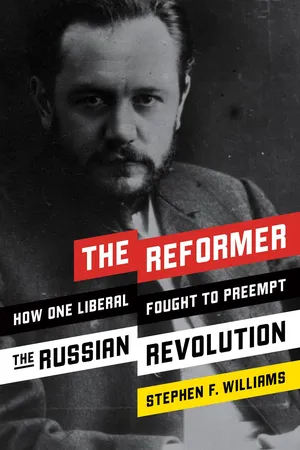Notes
INTRODUCTION: WHY MAKLAKOV?
1. A. Lunacharskii, K. Radek, and L. Trotskii, Siluety: Politicheskie portrety [Silhouettes: Political portraits] (Moscow: Izdatelstvo politicheskoi literatury, 1991), 240. Trotsky’s comment originally appeared in an article entitled “Guchkov and Guchkovshchina” [Guchkov and the Guchkov Era], in the newspaper Kievskaia mysl, no. 276 (October 6, 1913).
2. See, for example, P. N. Miliukov, “Sud nad Kadetskim ‘Liberalizmom,’” Sovremennye Zapiski 41 (1930): 347, 365, 368.
3. Quoted in Michael Karpovich, “Two Types of Russian Liberalism: Maklakov and Miliukov,” in Continuity and Change in Russian and Soviet Thought, ed. Ernest J. Simmons, Joint Committee on Slavic Studies of the American Council of Learned Societies and the Social Science Research Council (New York: Russell and Russell, 1955, 1967), 129, 138 (citing Miliukov’s remarks at Kadet party congress of October 12–18, 1905).
4. V. V. Shelokhaev, “Agrarnia programma kadetov v pervoi Russkoi revoliutsii” [Agricultural program of the Kadets in the first Russian revolution], Istoricheskie Zapiski 86 (1970), 172, 183, 192, 204–7. Peasant issues are discussed in various places, but especially in chapter 12.
5. V. A. Maklakov, Iz Vospominanii (New York: Chekhov Publishing House [Izdatelstvo imeni Chekhova], 1954), 146–48; see also I. P. Aleksinskii, “Pervye gody moego studentchestva (1889–1891),” in Moskovskii universitet, 1755–1930 (Paris: Izdatelstvo “Sovremmenie Zapiski,” 1930), 355, 363–65. S. V. Zavadskii, “Iz Zhizni Moskovskogo Universiteta v XIX stoletii,” in Moskovskii universitet, 1755–1930 (Paris: Izdatelstvo “Sovremmenie Zapiski,” 1930), 351–52, acknowledges Maklakov’s eloquence but reports the student vote as coming out the other way.
6. Compare a recent argument that abolitionist zeal, particularly in opposing Lincoln’s consideration of proposals to buy out the South’s slaveholders, had the effect of drastically prolonging the Civil War, with its terrible loss of life and long-run setback for healthy political evolution in the South. Thomas Fleming, A Disease in the Public Mind (New York: Da Capo, 2013).
7. N. I. Dedkov, Konservativnyi liberalizm Vasiliia Maklakova (Moscow: AIRO-XX, 2005), 64–65.
8. I. I. Tolstoi, Dnevnik, 1906–1916 [Diary, 1906–16] (St. Petersburg: Evropeiskii Dom, 1997), 469–70.
9. He was named acting minister on December 16, 1912; confirmed as minister on February 21, 1913; and relieved of the office on June 5, 1915.
10. Boris Efimov, Desiat desiatiletii: O tom, chto videl, perezhil, zapomnil [Ten decades: What I saw, survived, remembered] (Moscow: Vagrius, 2000), 204.
11. Bolshaia Sovetskaia Entsiklopediia (Moscow: 1926–47), 37:752.
12. Alexander Hamilton, Federalist No. 78.
13. Matthew Stephenson, “‘When the Devil Turns . . .’: The Political Foundations of Independent Judicial Review,” Journal of Legal Studies 32 (2003), 59.
14. See chapter 12, discussing the June 1916 legislation and the disconnect between peasant life and the country’s general laws.
15. See chapter 9.
16. Dominic Lieven, Nicholas II: Twilight of the Empire (New York: St. Martin’s Press, 1993), see page 106 for the Pobedonostsev quotation.
17. Ibid.
18. Stephen F. Williams, Liberal Reform in an Illiberal Regime: The Creation of Private Property in Russia, 1906–1915 (Stanford: Hoover Institution Press, 2006), 97.
19. For the absence of peasant rights, see Victor Leontovitsch, The History of Liberalism in Russia, trans. Parmen Leontovitsch, with a foreword by Aleksandr Solzhenitsyn (Pittsburgh: University of Pittsburgh Press, 2012). For peasant sayings about the law, see Boris Nikolayevich Mironov, with Ben Eklof, A Social History of Imperial Russia, 1700–1917 (Boulder, CO: Westview Press, 1999–2000), 304–5.
20. Richard Wortman, “Property Rights, Populism, and the Russian Political Culture,” in Civil Rights in Imperial Russia, ed. Olga Crisp and Linda Edmondson (Oxford: Oxford University Press, 1989), 13–32.
21. Bakhmetev-Maklakov Correspondence, 1:460 (Maklakov to Bakhmetev, August 30, 1921); ibid., 3:475 (Maklakov to Bakhmetev, April 1, 1930); Lieven, Nicholas II, 176–77.
22. Fred W. Carstensen and Gregory Guroff, “Economic Innovation in Imperial Russia and the Soviet Union: Observations,” in Entrepreneurship in Imperial Russia and the Soviet Union, ed. Gregory Guroff and Fred V. Carstensen (Princeton: Princeton University Press, 1983), 353.
23. Thomas C. Owen, Russian Corporate Capitalism from Peter the Great to Perestroika (New York: Oxford University Press, 1995), 187, and generally, 50–84, 115–38 [LR 246]; Thomas C. Owen, Capitalism and Politics in Russia: A Social History of the Moscow Merchants, 1855–1905 (New York: Cambridge University Press, 1981); Thomas C. Owen, “The Russian Industrial Society and Tsarist Economic Policy, 1867–1905,” Journal of Econom...
